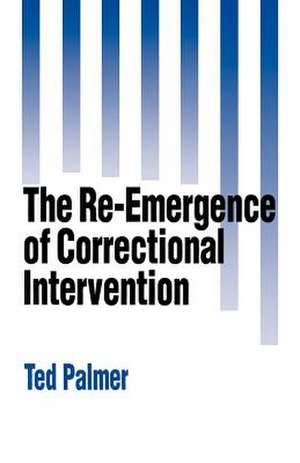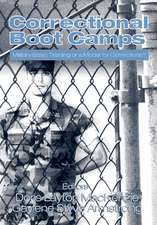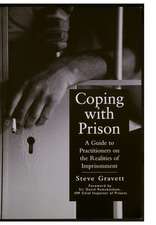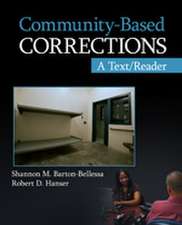The Re-Emergence of Correctional Intervention
Autor Ted Palmeren Limba Engleză Paperback – 12 mai 1992
Preț: 609.61 lei
Preț vechi: 717.19 lei
-15% Nou
Puncte Express: 914
Preț estimativ în valută:
116.69€ • 126.79$ • 98.08£
116.69€ • 126.79$ • 98.08£
Carte tipărită la comandă
Livrare economică 21 aprilie-05 mai
Preluare comenzi: 021 569.72.76
Specificații
ISBN-13: 9780803945388
ISBN-10: 0803945388
Pagini: 234
Dimensiuni: 151 x 207 x 15 mm
Greutate: 0.35 kg
Ediția:New.
Editura: SAGE Publications
Colecția Sage Publications, Inc
Locul publicării:Thousand Oaks, United States
ISBN-10: 0803945388
Pagini: 234
Dimensiuni: 151 x 207 x 15 mm
Greutate: 0.35 kg
Ediția:New.
Editura: SAGE Publications
Colecția Sage Publications, Inc
Locul publicării:Thousand Oaks, United States
Cuprins
Introduction
PART ONE: THE RE-EMERGENCE OF INTERVENTION
Major Themes in Intervention
Status of Intervention in the Early to Mid-1980s
Developments in Intervention since 1984-1985
Meta-Analyses and Literature Reviews
Intensive Supervision in Probation and Aftercare
PART TWO: INTERVENTION IN THE 1990s AND BEYOND
Challenges of the Coming Decades
Broader Perspectives for Serious Young Offenders
Developmental Factors
Further Observations and Issues
Appendix A
An Intensive Supervision Study
Appendix B
The CaVIC Study
Further Details
Appendix C
Aspects of Developmental-Adaptation Theory
Appendix D
Implications of Differential Representation
PART ONE: THE RE-EMERGENCE OF INTERVENTION
Major Themes in Intervention
Status of Intervention in the Early to Mid-1980s
Developments in Intervention since 1984-1985
Meta-Analyses and Literature Reviews
Intensive Supervision in Probation and Aftercare
PART TWO: INTERVENTION IN THE 1990s AND BEYOND
Challenges of the Coming Decades
Broader Perspectives for Serious Young Offenders
Developmental Factors
Further Observations and Issues
Appendix A
An Intensive Supervision Study
Appendix B
The CaVIC Study
Further Details
Appendix C
Aspects of Developmental-Adaptation Theory
Appendix D
Implications of Differential Representation
Descriere
In this decade, growth-centred intervention has re-emerged as a legitimate approach to the rehabilitation of criminals and now plays an accepted role with serious offenders. This role involves skill-development methods, control//surveillance techniques, psychologically oriented programmes and combinations of these procedures. This book describes the role - past, present and future - of rehabilitation within the context of other correctional approaches including the justice model philosophy. Palmer presents an intervention framework and a related theoretical structure that can assist in programme development, in intervention planning for offenders and in understanding as well as evaluating change processes.





















